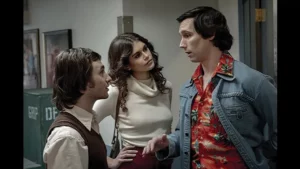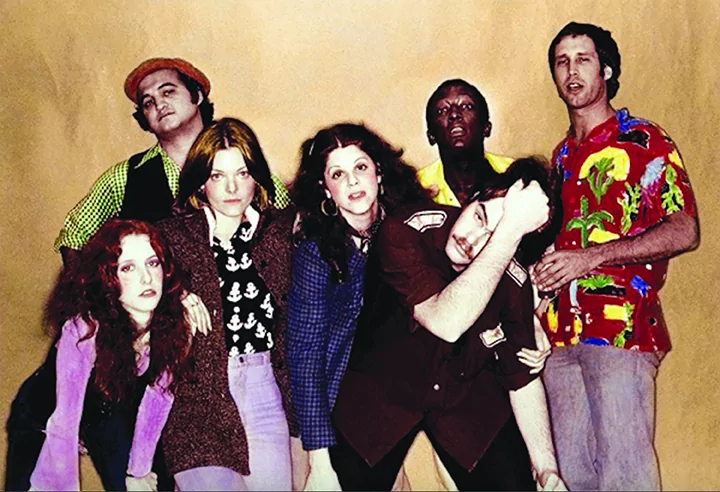
Jason Reitman’s new film, Saturday Night, dramatizes the behind-the-scenes chaos of the making of the first episode of Saturday Night Live in 1975. The movie, timed to release shortly before the show’s 50th anniversary, is an odd, if entertaining, duck — a bit inside-baseball for SNL fans and a bit of nostalgia for a time when the famous comedy sketch show felt countercultural and revolutionary, rather than a milquetoast product of a certain kind of establishment liberalism.
There have been a few of these not-quite-biopics in recent years — films or television shows that give “based on a true story”-style spins on the creative process that produced this or that cultural touchstone. 2012’s Hitchcock depicted the director and his wife Alma (Anthony Hopkins and Helen Mirren) as they defied studio execs to make the low-budget slasher Psycho. It was witty fun, if thin. Aaron Sorkin’s Being the Ricardos, in 2021, got a middling reception. The 2022 miniseries The Offer, about the making of The Godfather, was even more poorly received by audiences and critics. A friend of mine complained that it was “a lot of scenes of people casually saying things like, ‘Take the cannoli,’ then pausing to stare meaningfully at the camera.”

It’s not always clear who these films and TV shows are for, exactly, but they keep coming. Saturday Night is done in a tick-tock mode, depicting in approximately real time the shambolic last-minute preparations taking place the hour and a half before SNL’s premiere on Oct. 11, 1975, when the show was still called Saturday Night. The film is very much an ensemble, but to the extent that there is a main character, it’s SNL’s then-young creator and producer Lorne Michaels (Gabriel LaBelle), who has somehow convinced NBC’s staid executives to take a chance on, as one character puts it, “90 minutes of live television by a group of 20-year-olds who have never made anything.”
Now the night is here, and Michaels is facing conditions fit for a nervous breakdown. He hasn’t finalized the run-of-show. Half the sketches aren’t finished. His Teamster builders are more interested in smoking cigarettes than finishing the set, which, for some reason, includes a patio made of actual brick. One of his most important but surliest stars, John Belushi (Matt Wood), hasn’t signed his contract yet. Another, Chevy Chase (Cory Michael Smith), is preoccupied with what would be HR violations if SNL had an HR department, and Gilda Radner (Ella Hunt) is literally swinging from the rafters.
Meanwhile, the earnest puppeteer Jim Henson (Succession’s Nicholas Braun, who also plays Andy Kaufman) is outraged that writer Michael O’Donoghue (Tommy Dewey) thought it would be funny to hang Big Bird in a dressing room as an apparent death from autoerotic asphyxiation. George Carlin (Matthew Rhys) is angry at, well, the world. And Garrett Morris (Lamorne Morris, no relation) is anxious about his big comedy turn and seeks chemical assistance.

At the same time as he’s trying to corral his talent, Michaels is fighting to retain control of his show. His boss, Dick Ebersol (Cooper Hoffman of Licorice Pizza, also Philip Seymour Hoffman’s son), is trying to protect Michaels’s vision while getting him to bend on a few things, including working sponsor products into a sketch. A bunch of conservative suits are stopping by to observe. “Mr. Television,” Milton Berle (J.K. Simmons), seems determined to upstage SNL. Michaels’s creative partner and sometime-wife Rosie Shuster (Rachel Sennott) hasn’t indicated which surname she wishes to use in the credits. The head of NBC, David Tebet (a delightful Willem Dafoe), is threatening to pull the plug, and the network’s puritanical censor (Catherine Curtin) is running a red pen through all the sketches.
There’s more, but you get the idea. Of course, if you’ve ever worked on a stage play or other live production, you’ll know that the risk and chaos are what make the atmosphere so intoxicating. Saturday Night does a good job of capturing that sense of excitement — with a lot of winding, veering tracking shots through crowded rooms, Sorkin-style walk-and-talks, and an effective score that calls to mind a ticking clock.
Yet this project, while entertaining, does not feel innovative or risk-taking, particularly compared to the material it mythologizes. Reitman is commonly known as a conservative filmmaker whose films, which include Thank You for Smoking (2005), Juno (2007), Up in the Air (2009), and two Ghostbusters franchise entries (2021 and 2024), tend to eschew risky choices or formal experimentation. Saturday Night, for better or worse, doesn’t go for the kind of winking, metatextual, fourth-wall-breaking approach that 2018’s A Futile and Stupid Gesture, about the history of SNL forebear National Lampoon, did. It’s an enjoyable but forgettable two hours and feels (aptly?) a bit made-for-TV.
In 2019, SNL hired, then immediately fired, the comedian Shane Gillis. Gillis’s unfiltered, edgy, and extremely funny humor had always made him a slightly surprising hire, but SNL decided to fire Gillis after offensive jokes he’d made on old podcast episodes were dug up and waved around on social media by offense archaeologists. Five years later, Gillis is selling out Madison Square Garden, and it feels, in many ways, like he has surpassed the comedy sketch show that once snubbed him. Michaels recently told Entertainment Weekly that unhiring Gillis was the result of “overreaction.” When SNL recently had Gillis back on as a guest host, the episode got mixed reviews. Perhaps, as Saturday Night shows, no amount of nostalgia and reverence can quite capture what SNL once, a long time ago, had.
CLICK HERE TO READ MORE FROM THE WASHINGTON EXAMINER
J. Oliver Conroy’s writing has been published in the Guardian, New York magazine, the Spectator, the New Criterion, and other publications.









